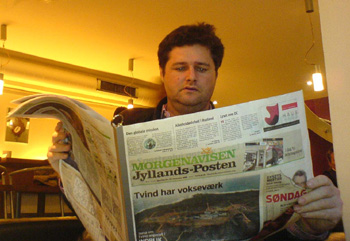The EU is going to ban ordinary lightbulbs because we are making the wrong choices and not buying the energy efficient ones. And who’s to blame for poor sales of the more efficient ones? The EU.
|
|||||
|
Swedish globalisation advocate Johan Norberg looks up a picture in a beautiful Italian church, and sees an early sign of where individualism comes from. Nice thoughts, succinctly expressed. Mark Steyn is one of those writers on the “right” who, I suspect, are admired by the sort of folk who read this blog. He is very funny: some of his takedowns on movies and politics have got me laughing out loud. (P.J. O’Rourke remains the Emperor and tends to be less pessimistic and is more libertarian). I mostly supported Steyn’s take on the case for overthrowing Saddam – although I get the impression that he has gone rather quiet due to the mess of the subsequent Coalition occupation of that tortured country. More recently, Steyn has pushed the following thesis: Europe is headed for an Islamist takeover because Those People are, to use the late Orianna Fallaci’s charming expression, “breeding like rats”, and that in 20 years’ time, they’ll be beheading criminals in Birmingham, forcing women to cover up on the Cote’ D’Azur, and they’ll be no more boozing in the Munich Oktoberfest. We are, as Private Frazer would say in Dad’s Army, the old British sitcom, all doomed. No wonder a certain kind of American who tends to despise those “commie Europeans”, is lapping it up. Steyn bases his thesis on demography. It is both the core but also the main weakness of his book. The problem I have with all such predictions is that the variables have a nasty habit of changing. Even a small change in the birth rate can have a huge impact on the subsequent growth rate of a population set. It is a bit like the law of compound interest. Even a small increase in cost of borrowing money or the yield on a stock can, over 10 years, make a big difference to a mutual fund or the size of your mortgage. Population growth statistics and predictions are like that. Remember the doomongering population scientist Paul Ehrlich? He bet that, by around now, the world’s population would have expanded so fast that we would be starving to death. As the late Julian L. Simon pointed out at the time, Ehrlich’s prediction was hooey. Erhlich overlooked a rather universal trait: as people get richer and no longer have to rely on big families to support parents in their dotage, birth rates fall. It seems to happen pretty much everywhere, including in those countries with very different religious and cultural traditions. This makes me wonder a bit about whether Steyn is over-egging the point. Demographics is clearly a vital issue, not least in explaining why European growth rates might remain sluggish in the decades ahead. But I cannot help but wonder that Steyn is making the sort of bold extrapolations on population that he would be the first to mock if it was, say, the latest prediction about global warming. Conservatives like Steyn are usually skeptics about Big Predictions, so it seems a bit odd that he has taken up the demographic prediction game with such enthusiasm. I do not think Steyn is a racist, although in a rather overheated review of his latest book, Johann Hari comes close to making that charge, although even Hari admits that Steyn makes some important points about the follies of multiculturalism and agrees that there is a serious problem with Islamic fundamentalism. But I think Hari does make the important point of questioning whether Steyn has let his own pessimism get the better of him. At last, somebody is speaking the truth to flower-power:
My money is on George Monbiot. Quick, somebody check his scalp for birthmarks. Well-intentioned politicians are of two kinds, those who want to help people directly and those who want to free people so that indirectly they can help themselves. The distinction may sound like a quibble, but it is not. – paragraph one of a Telegraph piece yesterday in which Tim Congdon explains why from now on he will be voting UKIP (thank you Iain Dale) I am writing these few words in the island of Malta, having spent the last week and a half enjoying the sights, sounds, and particularly, the culinary tastes, of this splendid island. This is now the second time that I have spent Christmas here and I strongly recommend it as a place to enjoy the turn of the year. The weather is currently warmish and sunny, with the thermometer around 17 degrees C. The locals celebrate Christmas with the unapologetic gusto of a strong Catholic country, laced with a mix of influences (Arabic, British, southern Italian). The front windows of shops and private homes often carry brilliant decorations and Nativity scenes. Most balconies – there are a lot of balconies – have plastic Father Christmases attempting to scale the side of a house. There are pleasingly few signs that planning officials tell people what sort of decorations to put up. Malta is noisy. Maltese people love fireworks with a passion that rivals that of the Chinese. Any excuse to set them off will do. And we are talking about seriously loud, bright fireworks. The great safety panic that seems to have stifled so much enjoyment in Britain, the USA and elsewhere is still held at bay – mostly – in this island of about 500,000 souls. There have been some bad accidents in the fireworks factories but the enthusiasm for the things is undimmed. Perhaps having survived the terrible bombings during the Second World War, the Maltese are not going to be frightened by a few rockets set off in the garden. I have visited this place more than a dozen times, got married here, drunk far too much red wine than is good for me here, watched several theatre plays here, sailed here, swam here, but more than anything else, eaten myself silly here. One of the finest dishes you can get is Lampuki Pie, which is made from this particular fish. I have just consumed a rather large part of one. I need to go for a lie down. I wonder why this has not set any fur flying yet?
Is it because the French did it first? Possibly. Though it does seem to me that the Dutch prohibition is much broader than the French one. Perhaps it is something to do with the fact that France is a more prominent and important country than Holland. Anyway, whatever the reasons, this news from the Netherlands remains (for the moment at least) on the mere periphery of the radar. The more interesting question, as far as I am concerned, is whether this is (a) an unacceptable state repression of personal liberty and freedom of choice or (b) a necessary and welcome bulwark against the growth of radical Islam in Europe?  No, I cannot actually read Danish Yesterday morning, I strugged to get out of bed after the Friday Samizdata party, caught the train to Stansted airport, caught the early flight to Aarhus in Denmark, caught the bus into town, took lots and lots of photos for a large Samizdata posting, and then checked in to my hotel. Wifi was provided in the lobby but not in the rooms. Oh well, good enough. (The group of intense looking young men crouching round a laptop and speaking Russian at the table in the lobby closest to a power outlet does add to the atmosphere, but also makes it harder to keep my laptop charged). However, my card reader failed to be packed in the struggle to get out of my flat yesterday morning, so I could not upload the photos for the post. My plans to elicit a “What the <expletive> is Michael doing in Denmark immediately after the Samizdata party?” reaction from the readership had failed. No problem really – I shall just post the article in a day or two. Meanwhile, Denmark is a land of very flat countryside, nice pubs, friendly, decent and at times brave people (even if they do have a slightly worrying overenthusiasm for historical enactment), adequate coffee, and nice pubs. I am enjoying the weekend out of London. Bonus question though. What the <expletive> is Michael doing in Denmark immediately after the Samizdata party? Kudos for anyone in the commentariat who can figure it out. It is, I suspect, no accident that it is in Europe that climate change absolutism has found the most fertile soil. For it is Europe that has become the most secular society in the world, where the traditional religions have the weakest popular hold. Yet people still feel the need for the comfort and higher values that religion can provide; and it is the quasi-religion of Green alarmism and what has been termed global salvationism – of which the climate change issue is the most striking example, but by no means the only one – which has filled the vacuum, with reasoned questioning of its mantras regarded as a form of blasphemy. – Nigel Lawson, former Chancellor of the Exchequer, quoted today by Guido Fawkes Overconfident? Governments are happily increasing their power everywhere by stoking fear of terrorists. Why risk undermining that by spilling over into loony implausibility?
Utter tripe. Terrorism does kill, indubitably. That embarrasses governments that pretend to be perfect protectors. Ignoring government self-image, it might be a serious enough threat to some people in some European states, to be worth some European governments spending a lot of treasure tackling it; and it might even be serious enough to merit changing the law to cope with it. I doubt both those prescriptions, and the latter more than the former, as regular readers will know. But they could conceivably be true. However, let us review the facts against Mr Reid’s stronger assertion:
Witless hyperbole is the stock-in-trade of dictatorships propagandising their presumed-credulous servitors, in order to buff up their self-image. (Read any government-endorsed press story from an African or Mddle Eastern bullydom.) Dictatorships cannot bear to be embarrassed, and are embarrassed by terrorists, because they can never concede anything is outside their control. But in liberal states that sort of pretension to deity is supposed to be mocked from office. Which is Britain? Or is the question, which is Europe? See if you tell the difference. |
|||||

All content on this website (including text, photographs, audio files, and any other original works), unless otherwise noted, is licensed under a Creative Commons License. |
|||||



